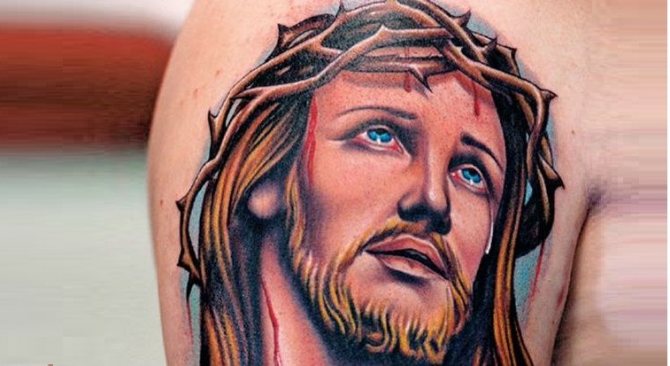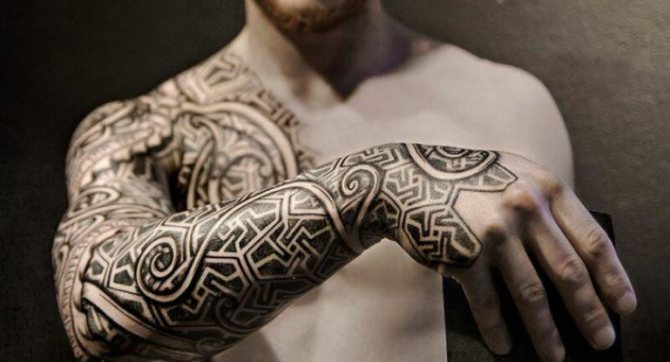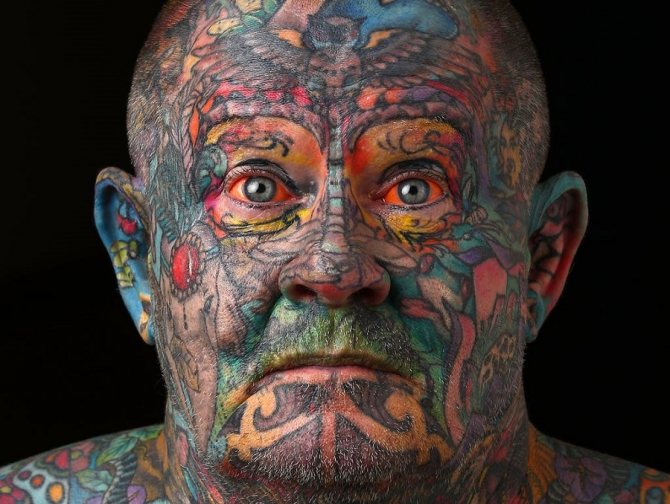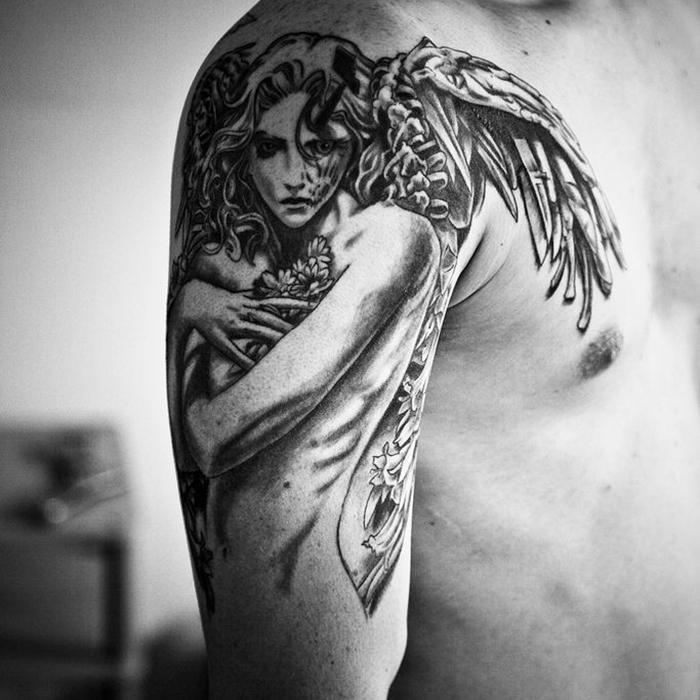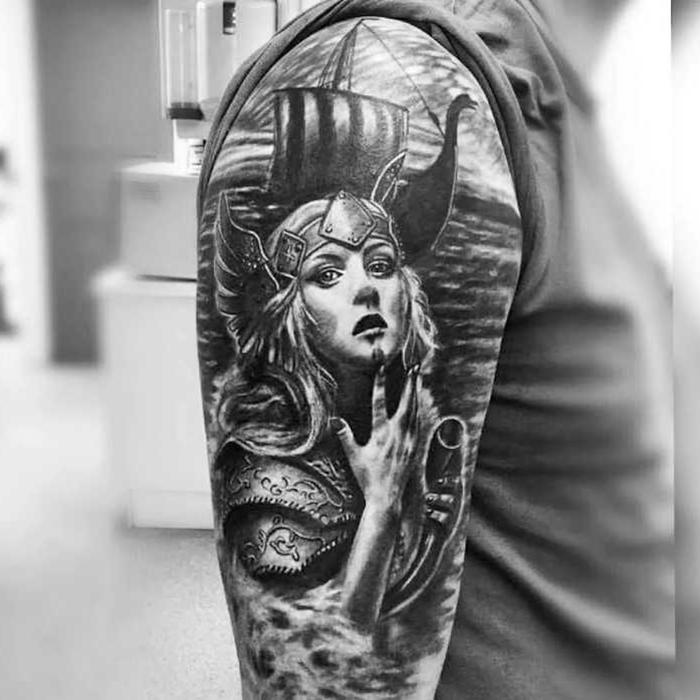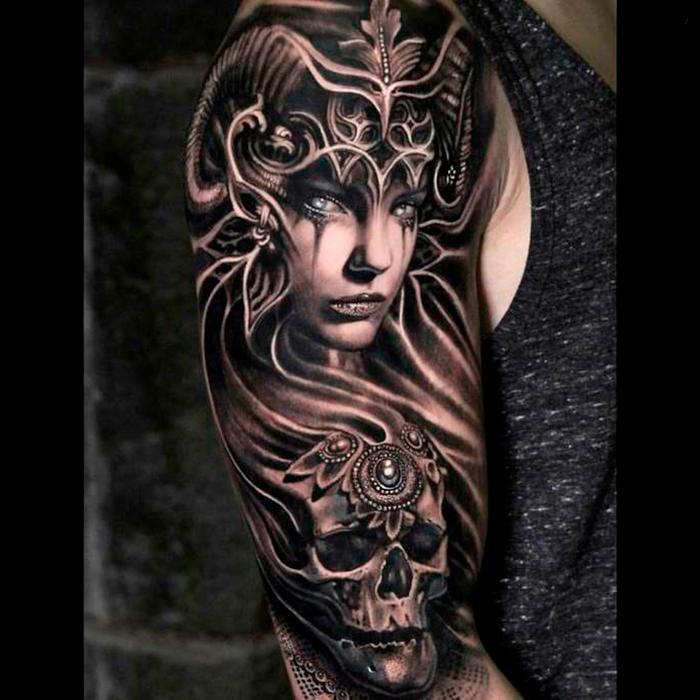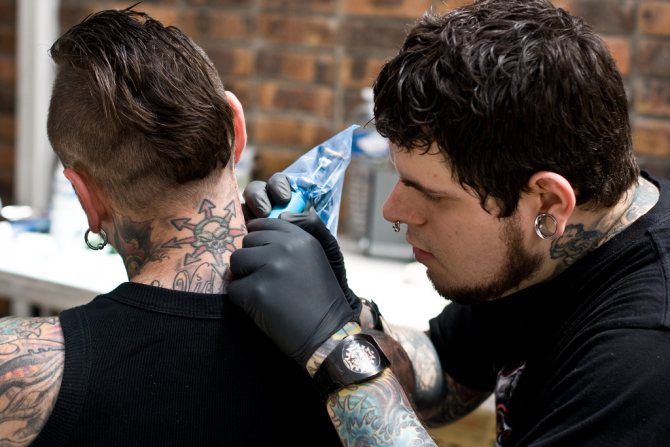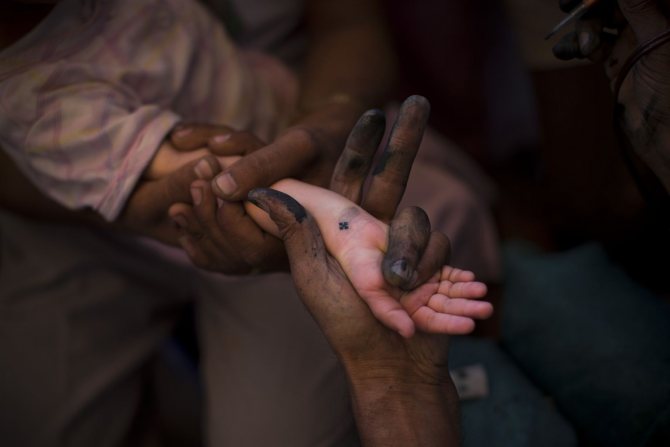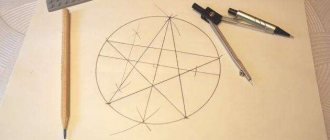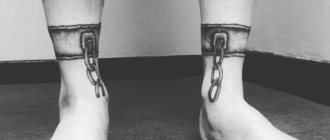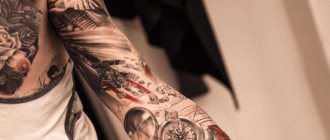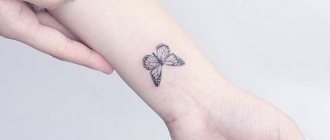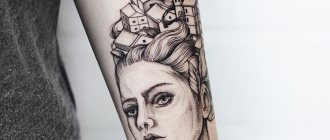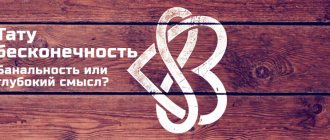In ancient Egypt, there were many magical symbols that people empowered. Mythology abounds with various deities who patronized a certain area of life. One of the most striking figures in this sense is the god Ra.
The Egyptians believed that this particular god controls the celestial luminaries, turning day into night and night into day. Usually, tattoos with such a body drawing are stuffed on people who are interested in mythology and history, as well as believe in the patronage of higher forces.
God Ra: meaning
Ancient people were in close relationship with nature, and the Sun was a source of light and heat for them. Not surprisingly, they worshipped the celestial luminary and treated him with special reverence. They had special ceremonies, feasts, praises and requests for his help.
According to mythology, the god Ra is the patron saint of light and darkness. By day he warms the Earth with his warmth, while at night he illuminates the afterlife. There he fights his main adversary, the serpent Apophis, who tries to swallow the sun so that daylight is extinguished forever. With the coming of morning, the god manages to defeat the serpent and dawn comes to Earth.
A tattoo of this deity is depicted as a pharaoh with a human body and the head of a falcon. If the image is complemented by a crown in the form of a solar disk, the tattoo symbolizes the highest spiritual knowledge, wisdom and greatness. Cross, which is holding in the hands of Ra, represents immortality and rebirth, and the scepter signifies divine authority.
How is God portrayed in tattoos?
The religious theme in tattoos often carries information about which faith a person belongs to. Everyone puts an individual meaning into such an image on the body and their personal message.
Deities can be printed in the form of images and inscriptions. It is worth noting that the tattoos of the gods also include images of churches, domes, icons and other religious paraphernalia. One popular inscription of faith and religion, is the phrase "Only God is my judge," which can be printed in a different font or in a foreign language. Often, believers pad Latin phrases about religion because Latin is the most ancient progenitor of modern languages. There is a statement that the tattoo about God carries a strong energetic charge and deep meaning, therefore it is necessary to approach to a choice and execution of such tattoo thoroughly.
In the form of a falcon
In another version, the god is depicted as a falcon that flies high into the sky, reaching all the way to the sun. Such a symbol is a guide to the realm of the dead and symbolizes spiritual purification. Such a tattoo is a powerful energy filter with which the wearer can avoid reacting to negative phenomena and maintain mental balance. A strong bird with a gaze symbolizes the ability of a person to observe and control the course of events, not allowing opponents to destroy plans.
Tattoo with the god Ra can be stuffed as a patron, illuminating the path of life. The bearer of such a tattoo is able to see clearly what is happening, to distinguish the truth from lies and not to get into adventurous stories. Wax drawing functions as a talisman and amulet, helping its owner to translate ideas into life, without succumbing to the influence of others.
Sometimes Ra is depicted as the Phoenix, which rises from the ashes. Like the bird that burns in the fire, Ra transforms day into night, gradually taking the light from the Earth, and with the dawn returns it. This tattoo symbolizes the ability to overcome obstacles and find a way out of the most difficult situations. The owner of such a tattoo has a strong character, inflexibility and vitality. He tells those around him that for him there are no tests, which he could not cope. The tattoo is a kind of challenge to the world.
Who does?
The God tattoo is a kind of talisman or symbol of life, so people who put a religious image on themselves have their position in society and want to express it. Such decorations on the skin are made by men and women. For example, Anubis is inscribed for both sexes and carries the same sacred meaning. In order to correctly read the meaning of the divine tattoo, you need to pay attention to the history of the person and his life path. It is important to remember that such drawings require precise and painstaking work, so only professional tattoo artists are chosen to work with the image.
Sun God in Ancient Greece
In the culture of ancient Greece, this god was considered a symbol of masculinity. Warriors put an image with him on the body before important battles in order to gain the support of Ra. But before doing so, they would give the god a gift of some sort and ask for his help. When in high spirits, the god would give warriors a fiery power that would blind and leave enemies vulnerable. A tattoo of the deity helps the wearer to resist opponents, resolve conflicts in their favor, and avoid the negative effects of ill-wishers.
In ancient times, Ra was one of the main gods of the people, as their lives depended on the Sun. With the onset of darkness, people were defenseless and could become victims of predatory animals. People feared that the sun might never rise, so they greeted each dawn with praise to the luminary. They received not only the ability to see but also the ability not to die of cold. Tattoo with Ra is a powerful symbol of the relationship between man and the higher forces. This kind of body art is associated with people who show great respect for the universe and are grateful for all the gifts it offers. The patrons of such tattoos realize how small and helpless a man is in front of the elements of nature and how quickly death can come.
The tattoo of the god Ra symbolizes:
- power;
- indestructibility;
- immortality;
- rebirth;
- purification;
- the patronage of higher powers.
The Bible and Tattoos
People often wonder what God has commanded us in connection with tattoos. There are not many direct references to tattoos in the Bible. This is because the people who put such age-old inscriptions and images on their bodies did not belong to the people who received the law of Moses. They were people of pagan beliefs.
|
Thus, in the book of Leviticus we find the words, "For the sake of the dead, do not make cuts on your body and do not imprint writing on yourself. I am the Lord" (Leviticus 19:28). The above quotation is more than obvious. God says "no" to such a custom. But why is such an act condemned? To understand this commandment, we must delve into the culture of the time.
Most of the cultures of that era were barbaric in nature, but the people of Israel formed a new nation. The law God gave to Moses was the foundation upon which that nation was built. The people of Israel were called to live in an entirely different value system from the culture of violence, robbery, and death of other, neighboring nations. By tattooing their bodies, the Jews would be no different from the Gentiles who committed ritual murder, "holy" violence, mass slaughter, and deified passions destructive to the human soul. This may be one of the reasons God gives a commandment against tattoos.
In our culture, tattoos no longer carry the same meaning as they did in Moses' time. In the age of grace, the body is the temple of the Holy Spirit, with Christ in it by virtue of the Eucharist. If we look at people's motives for getting tattoos, we see that for the most part they simply want to distinguish themselves from others. But non-conformism, following fashion trends, the desire to shock - all this is alien to the law of love of Christ, crucified and risen from the dead.
Some believe that tattoos will make them more beautiful. This speaks to their desire to improve what God has made (cf. Ps. 138:14)[1]. Or it indicates an inferiority complex and the fact that they are not satisfied with their bodies, as well as indicating a need for a new identity, a search for a different, more interesting "I", which is characteristic of a personality in crisis; having no merits to demonstrate, they try to impress others this way (in the original meaning of the word, too). Meanwhile, the novelty of a tattoo may arouse surprise for no more than a second, only to then drown in a stream of platitudes already seen more than once.
|
In the Muslim world, Christians tattoo a cross on their arm so that they can be buried in a Christian manner if they die. However, this also speaks of their desire to die for Christ and confess Him until death, should they be overrun by radical Islamists for whom Christianity is a constant target. In this case, the tattoo may signify a vocation to martyrdom, a desire for confession until death, and an unbroken love for the Crucified One.
Thus, when tattoos are not indicative of faith, they are an unfortunate substitute for personality, culture, erudition, sense of humor, cheerfulness, openness, faith, creative uniqueness. They serve only as an indicator of a desperate search for one's own self, increasingly shouted, a search in places where it was not and will never be.
Meaning of the tattoo for men
A tattoo with this symbol for men is a powerful talisman, giving its wearer a strong spirit, courage and determination. This body image fills a man with solar energy, gives him good health and longevity. Young people pencil such a tattoo in order to enlist the support of higher forces in case of danger.
God Ra for men represents militancy and courage. The tattoo will be a strong talisman for people whose activities are connected with military service or security. The falcon on the tattoo endows its wearer with extreme attentiveness, which allows the man to notice the approaching danger in time and quickly respond to it.
Why do people make "tattoos"?
First of all, let's try to understand what makes people get tattoos in the first place. Someone, obviously, gets a tattoo consciously, someone simply out of imitation of peers or "stars", out of posing. In post-modern society, the understanding of what is right and what is wrong has been lost. Therefore, the prevalence of such phenomena is not surprising. There is no solid moral foundation, there is no criterion for it in the mind, there is no purpose or meaning, and there is no reflection. The body is perceived only as an external shell, with which you can do anything you want. It is my property, so I do what I want with it. Probably the reasoning is: "It's fashionable, it's considered stylish, this or that popular character did it. Why shouldn't I do it?" Young people lack the maturity to understand that if tattoos are applied for the sake of fashion, it is simply unreasonable: one fashion today, another tomorrow, and the tattoo remains. At the same time the body grows decrepit, and by the old age all the drawings on the body will also look as ugly as a painted corpse.
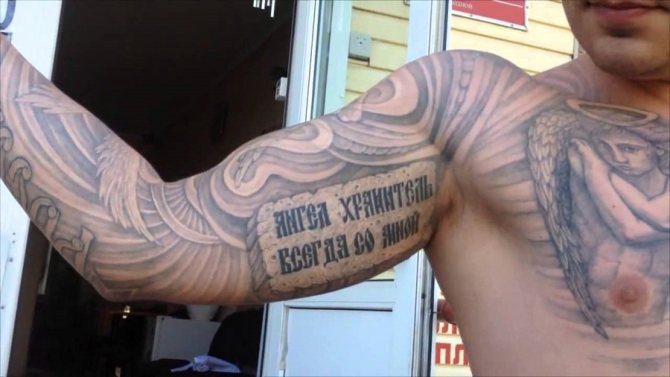

The other category is those who deliberately get tattoos. There can be many reasons for this. This way they want to confirm their belonging to a certain group or musical genre, and self-affirmation, recognition in certain circles, where it is accepted, and a desire to fix a stage in life, etc. In our country, tattoos have always been associated with the prison subculture, causing rejection by the society. The presence of such tattoos characterizes a person without extra words. As an example, a line from Boris Grebenshchikov's song "Governor" gives a negative assessment of the blacks in power, who have escaped from the dirt to the riches:
"Under his Brioni shirt, tattoos on his chest, And murdered journalists Without you, you're a dime a dozen."
We won't dwell on the prison subculture. Let us only note that prisoners' tattoos have a special meaning and language that is understood unambiguously in their world. The use of tattoos in the criminal environment is highly regulated, inaccuracies here can lead to serious conflicts.
Decorative tattoos do not carry this meaning. Nevertheless, the presence of such "accessories" affects the consciousness of their carriers, creates a psychological attitude, determine the model of behavior. People with tattoos, with whom I was able to communicate, admitted that after the application of inscriptions and drawings "something happens internally, something changes". It cannot be otherwise. Recall the philosophical principle of the dialectical unity of form and content: there is no material system that would not have content and form.
Meaning of tattoos for girls
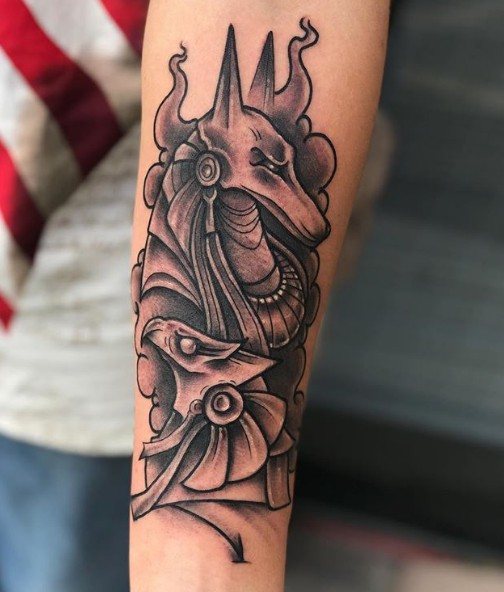

Ra originally belonged to the men's symbols, but later the picture began to be used and girls as a tattoo. This image helps women to find strong qualities, which are mainly characteristic of the strong sex: fearlessness, courage and bravery.
Girls with such a tattoo have a keen sense of justice. They will not pass by, having seen the mockery of the weak, even if it will be quite dangerous. The tattoo also endows women with intuition and the ability to foresee the best outcome of events.
The influence of the Slavic signs on a person's life
Ancient Slavic symbols performed in the form of a tattoo play a positive role, for example:
- improve health and increase immunity to most diseases;
- provides protection from dark forces and black magic;
- allow you to unleash your latent creative potential and ability to create;
- improve physical endurance;
- make you more balanced and peaceful;
- increase longevity;
- help you achieve your goals;
- allow you to establish a spiritual connection with the world around you and live in harmony with it.
Who is Svarog?
Find out what awaits you today - Horoscope for the zodiac signs
By popular request of subscribers, we have prepared an accurate horoscope app for cell phones. Forecasts will come for your zodiac sign every morning - impossible to miss! Download for free: Horoscope for Every Day 2020 (available on Android)
Before you decide to do something as responsible as a tattoo, you need to get as much information about it as possible. Let's talk about Svarog, who is he?
Svarog is. the main god of the Slavic pantheon, the Father of all the Gods among the Slavs. According to the legends, it was he who created our Earth and all the stars in the universe, forging them with his huge hammer with magical properties. He also revealed to the ancient people the ability to master fire, cooking with it, and also - gave them tools, taught them how to work the metal, to make weapons.
In literal translation from Sanskrit Svarog's name means "heavenly father. If we compare Slavic mythology with Greek mythology, the Hellenes had a prototype of Svarog was Zeus the Thunderer. Svarog's wife was Lada - the goddess of harmony, family and life. From their union came all the Slavic gods.
God smith can be depicted on the body in several ways: for example, as an old man in the prime of life with a sword or hammer in his hands. Here much depends on the imagination of the master and, of course, the individual wishes of the client. Experts recommend performing such a tattoo in a realistic genre and on a sufficiently large area: say, on the entire shoulder or on the part of the back.
The cost of the tattoo will be quite high, but it will constantly delight you with the smallest details, a whimsical game of color transitions and lines - a true masterpiece of art! The main thing is to find a good master, do not save, and it is better to overpay, because to remove the tattoo is much harder than to do.
Mostly Svarog tattoos are chosen by the representatives of the stronger sex: men with their help underline their strength, masculinity, demonstrate their spiritual development and respect for their ancestors, their native Gods. Svarog tattoo sketch you can see below
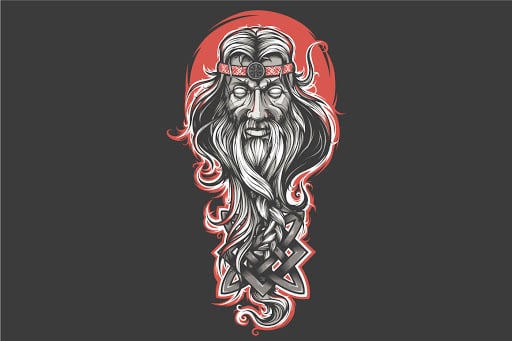

What to do with tattoos if you already have them?
So what to do if the tattoos are applied? For people who enter the Church through baptism, this is not a barrier. The aforementioned Council of the Metropolis of Belokrinitsa emphasized this in its decision. Apparently, in practice there were cases where priests did not know what to do and demanded that the tattoos be removed. But this is very expensive and not always possible, although desirable. If a person has defiled his body with tattoos after baptism, he should repent of what he has done and undergo certain penance. We believe that those clergymen who order tattooed individuals to always wear clothes concealing the inscriptions and drawings as penance are right. Those who work in this industry should leave it as sinful.
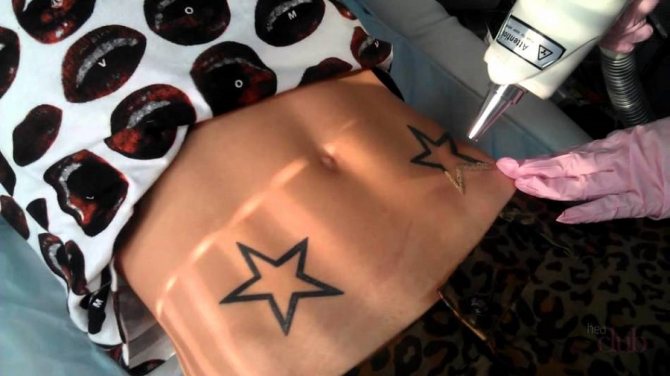

Another question remains, still hypothetical: can a wearer of tattoos become a priest? Let us express our private opinion, which needs to be considered collectively. We think there may be an impediment to ordination of a physical nature, related to the bodily defects of the appointee. In the same way that scopts are not allowed into the clergy (according to the first rule of the First Ecumenical Council, "If, when healthy, one has scoped himself, he must be excluded, even if he is numbered among the clergy"), so are tattooed people. Especially if these tattoos cannot be concealed. How can a man with a tattoo on his arms be a liturgist? And who would approach him for a blessing?
Such is our reasoning on this topic. And I would like to end with an appeal to avoid the evil described in the words of the great apostle Paul:
"What is the commonality of the temple of God with idols? For you are the temple of the living God, as God said, 'I will dwell in them and walk in them; and I will be their God, and they shall be my people. And therefore come out from among them, and be separate, saith the Lord, and touch no unclean thing; and I will receive you. And I will be a Father to you, and you shall be My sons and daughters, says the Lord Almighty. Therefore, beloved, having these promises, let us cleanse ourselves from all filthiness of flesh and spirit, doing holiness in the fear of God" (2 Cor. 7:1).

